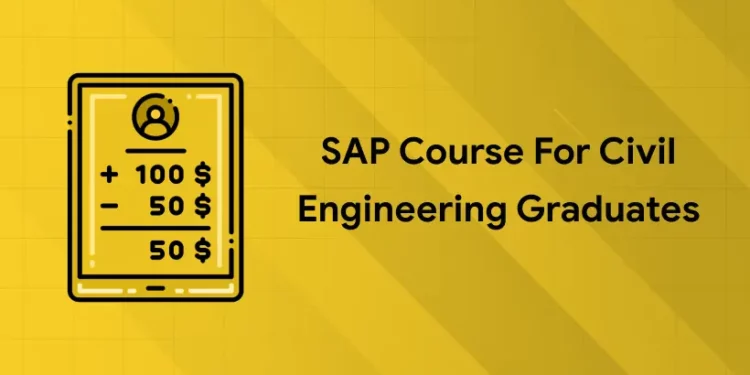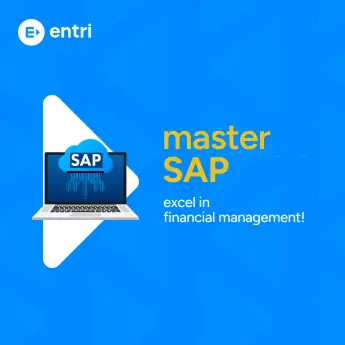Table of Contents
Systems, Applications, and Products in Data Processing, or SAP for short, was first established in Germany in 1972 as a software program to combine different business operations. SAP has changed over the years and established itself in a variety of fields, including civil engineering. So, it is best to learn an SAP module you may find interesting if you want to progress rapidly in your career as a civil engineer. But what is the best SAP course for civil engineering graduates? This blog will help you find an answer!
SAP Course for Civil Engineering Graduates: Introduction
SAP’s cloud ERP solution, “RISE with SAP,” is chosen by Indian engineering and construction companies as they prioritize digital transformation to drive much-needed changes to business processes and systems and become future-ready. This helps them become intelligent, and sustainable in the cloud and promotes business innovation.
It can be difficult to remain competitive, efficient, and organized in the fast-paced, intricate world of construction. It takes accuracy, openness, and data-driven decision-making to manage multiple tasks, budgets, and teams across various projects. Here is where the business benefits from SAP Business One for Construction Industry systems.
Imagine having a single platform that can handle all your important business operations, including field operations, procurement, finance, project management, and inventory. SAP’s primary promise in the construction industry is to streamline processes, improve teamwork, and enable you to make more informed decisions, all of which will eventually result in higher productivity, lower costs, and better project outcomes.
However, let’s first examine how ERP systems function in the construction industry before delving further into the advantages and features. We’ll look at the main attributes and modules that address the requirements of the construction sector in the following section.
Why Civil Engineers Should Learn SAP?
Adding SAP knowledge to their skill set is something that civil engineers who want to differentiate themselves and improve their chances of landing a job in the modern world should give careful thought to. As the infrastructure and construction sectors undergo digital transformation, proficiency with platforms such as SAP is becoming increasingly necessary and not just a differentiator. Given below are a few reasons why Civil Engineers should learn SAP course for civil engineering graduates.
Easier Planning
Bid farewell to disorganized spreadsheets and forgotten details. From preliminary estimates to resource allocation, ERP seamlessly links all phases of your planning process, guaranteeing accuracy and consistency throughout each project. No more scurrying for resources at the last minute or wasting materials.
Smoother Communication
Lags or confusion in communication? Not anymore! Everyone, from executives to field workers, can access the most recent information in real time owing to ERP’s centralized platform. Keep everyone informed by collaborating easily, sharing updates, and approving changes.
Accurate Estimates
Are you sick of losing money due to underestimating expenses? ERP creates extremely accurate quotes that are customized for every project by analysing labour requirements, material prices, and historical data. You can gain profits in more jobs with confident, competitive bids instead of relying on guesswork.
Data-Driven Decisions
ERP examines your tasks, assets, and schedules, revealing insightful information to help you make informed decisions. Determine possible hazards, allocate resources as efficiently as possible, and make wise decisions to maintain the budget and timeliness of your projects.
More Job Opportunities
Being proficient in SAP provides access to employment opportunities in many countries and a variety of civil engineering-related fields.
Streamlined Processes
Forget about tracking down information and balancing different systems. By automating time-consuming processes like purchase orders, data entry, and progress reports, ERP frees you and your team to concentrate on what counts, that is building. Consider the time savings, increased productivity, and projects completed ahead of schedule!
Purchasing construction ERP is an investment in the success of your company, not just in software. Planning, communication, estimation, and decision-making are all optimized, opening the door to future success, productivity, and profitability. More construction firms are realising the potential of SAP and implementing it. So, learning SAP modules will be a good addition to a civil engineering graduate’s resume.
Join Entri to learn SAP MM! Learn the best SAP course !
Master SAP with Expert-Led Courses
Unlock your potential with our comprehensive SAP courses! Learn essential modules like SAP MM (Materials Management), SAP SD (Sales and Distribution), and SAP FICO (Financial Accounting and Controlling) from industry experts.
Know MoreRecommended SAP Modules for Civil Engineers
Some of the recommended SAP modules for Civil Engineers are listed below. Look at this list before deciding on an SAP course for civil engineering graduates.
- SAP MM (Material Management)
- SAP PS (Project Systems)
SAP MM and Others
In the building and real estate sectors, material management is crucial. Material is the only component that accounts for a significant portion of the project’s cost. Materials may account for over 60% of the project’s overall cost. A project’s successful completion depends on the efficient management of materials, which is a crucial and significant topic for any business.
Effective material management can also boost the business’s overall earnings. Planning, arranging, and regulating the flow of materials from their original purchase to their destination is the focus of the scientific technique known as material management. There are four primary processes in material management, namely:
- Planning
- Procurement
- Logistics
- Inventory
The best option for material management in the construction sector is SAP’s Material Management (MM) module. All material management data is centrally stored on the server when using SAP. All business functions are streamlined by SAP. This provides the desired result with a single click. An organization’s internal communication can be enhanced with the aid of an SAP system. Information can be retrieved as needed because SAP is user-friendly.
From this, we can understand that SAP MM is the most important SAP module when it comes to a civil engineering graduate and hence an SAP MM course is the best SAP course for civil engineering graduates.
But before going into other topics, let us look at one more module that is important for the construction industry.
SAP PS (Project Systems)
SAP’s Project System (PS) module was created especially to give its clients complete, integrated project management capabilities. A project is a complex venture that involves vast amounts of data of various kinds.
SAP Project Systems (PS) is a project management tool that helps businesses stay on schedule and within budget while managing projects at every stage of their lifecycle. It is the perfect tool for complex projects like construction, service, production, and investment across all industries because of its close integration with SAP’s Finance and Logistics modules.
In addition to managing your complete project system, this integrated project management tool offers the integration features required for other SAP apps, such as SAP Finance and Logistics and SAP Materials Management. It assists in managing projects from the planning phase through their execution and beyond and is a component of the complete SAP Project and Portfolio Management solution.
Regardless of the size, complexity, or industry you are in, SAP’s Project System module assists you in planning and managing every phase of your projects. The solution is particularly helpful for larger, more complex projects that need more technological functionality and project management capability than your typical project management team can handle without the use of external project management tools. This is especially true when combined with its smooth integration with other SAP applications and modules.
Benefits of SAP Certification for Civil Engineers
Our cities and skylines are shaped by the dynamic force of the construction industry. However, managing its intricacies, such as balancing several projects, complex budgets, and diverse teams, can be like walking a tightrope while wearing a blindfold. In this situation, SAP Solutions becomes your stabilizing and guiding force.
Consider ERP to be the brains of your construction company, integrating key operations such as field operations, finance, procurement, project management, and inventory. However, the transformation it brings about is where the true power lies. Once you gain skills in ERP software it becomes your superpower. Here’s how it makes your building better, quicker, and more intelligent.
- Using a centralized, integrated system, manage complex budgets, resources, and deadlines across several projects. ERP unifies all of this for more efficient tracking, planning, and productivity.
- Give up fragmented data and gaps in communication. ERP establishes a single source of truth, facilitating smooth team collaboration and real-time information exchange.
- No more inaccurate estimates and lost profits. ERP increases profitability and competitiveness by analyzing data for accurate estimations.
- Get rid of guesswork and poor decisions. ERP provides information for identifying risks, allocating resources optimally, and making well-informed decisions that guarantee project success.
- Automate time-consuming processes such as purchase orders, reports, and data entry. ERP allows resources and time to be allocated to strategic tasks.
- Overcome disorganized supplier relationships and material tracking. ERP combines procurement and inventory control to ensure optimal stock levels and seamless supply chain operations.
- Rigid systems have trouble expanding. ERP accommodates changes in the industry and adjusts to your changing needs.
- Client satisfaction results from better project delivery, precise deadlines, and effective communication. ERP gives you the ability to go above and beyond and establish credibility.
- Get noticed in a crowded marketplace. ERP gives you a competitive edge by streamlining operations, cutting expenses, and completing projects on schedule and within budget.
How to Get Started?
At first, it could be confusing for civil engineers to comprehend the value of business-centric software in their field. Nonetheless, SAP modules have proven to be extremely useful in infrastructure and construction projects, especially those about project management and resource optimization.
But you don’t have to worry about not knowing the basics or having no experience. There are many platforms on the internet now offering courses that teach your SAP modules from the fundamental principles itself. But which might be the best among them? Have you heard of the Entri Elevate SAP MM certification course? This course has many benefits which are listed below.
- Online Format
- Three-month duration
- Live sessions
- Recorded sessions
- Assessment
- Mentorship
- Placement assistance
- Group discussions
These are not facilities that every platform might offer at an affordable course within a short duration. So join today itself and make full use of all the opportunities the Entri Elevate platform can bring to you!
Join Entri to learn SAP MM! Learn the best SAP course for civil engineering graduates!
Master SAP with Expert-Led Courses
Unlock your potential with our comprehensive SAP courses! Learn essential modules like SAP MM (Materials Management), SAP SD (Sales and Distribution), and SAP FICO (Financial Accounting and Controlling) from industry experts.
Know MoreCareer Opportunities After SAP Training
Once you complete your SAP certification as a civil engineer, you can work in many sectors. Some of them are mentioned below.
- Construction firms
- Infrastructure development
- Real estate and property development
- Consultancies
You can work in many positions as given below.
- Project Manager
- Procurement Specialist
- Consultant
- Purchase Executive
- Project Leader
The roles you land in are heavily influenced by the SAP module you choose to learn and get certified in. Some SAP modules are suitable for career growth in certain sectors. Many internet experts suggest that SAP MM is the best SAP course for civil engineering graduates.
Learn SAP MM from the best mentors! Join the best SAP course for civil engineering graduates!
SAP Course for Civil Engineering Graduates: Conclusion
In summary, SAP Software for Construction is a transformation rather than merely a tool. It skillfully connects the different strands of your construction company, creating a tapestry of better operations, more intelligent and thoughtful choices, and eventually successful projects. Software for enterprise resource planning, or ERP, in the construction sector, has become an essential tool for streamlining and improving operations. ERP systems help construction companies become more efficient, transparent, and profitable by integrating a wide range of functions, such as project management, procurement, accounting, human resources, and more.
RISE with SAP will not only guarantee SAP’s clients’ smooth cloud adoption and transformation, but it will also give them access to the true advantages of change enabled by the cloud. SAP is committed to making its clients more flexible, relevant, effective, and agile. The goal of ERP investment is to shape a future of growth and sustainability in a dynamic industry, not just to address the present. It’s about accepting efficiency, flexibility, and teamwork as essentials rather than extras. So, with the help of Construction ERP software, decided to not only build structures but also a more robust, future-proofed career. Now is the time to make wiser decisions.
Master SAP with Expert-Led Courses
Unlock your potential with our comprehensive SAP courses! Learn essential modules like SAP MM (Materials Management), SAP SD (Sales and Distribution), and SAP FICO (Financial Accounting and Controlling) from industry experts.
Know MoreFrequently Asked Questions
What is the salary of a civil engineer with SAP skills in India?
In India, a civil engineer with expertise in SAP Enterprise Resource Planning (ERP) typically makes ₹559,000.
Is SAP 2000 an SAP ERP module?
SAP ERP is a program for enterprise resource planning. It includes an organization’s primary business operations. Conversely, SAP2000 is a program for creating mathematical models and performing mechanical analyses of civil structures, such as concrete walls and cable-stayed bridges. Its importance stems from the fact that civil engineers can start with their designs, proceed with analysis, and use the software to determine how the structure will respond to the operator-specified applied conditions. Additionally, the software can optimize the structure on its own and alter the materials used for various structural components based on the list the operator supplied when building the model.










